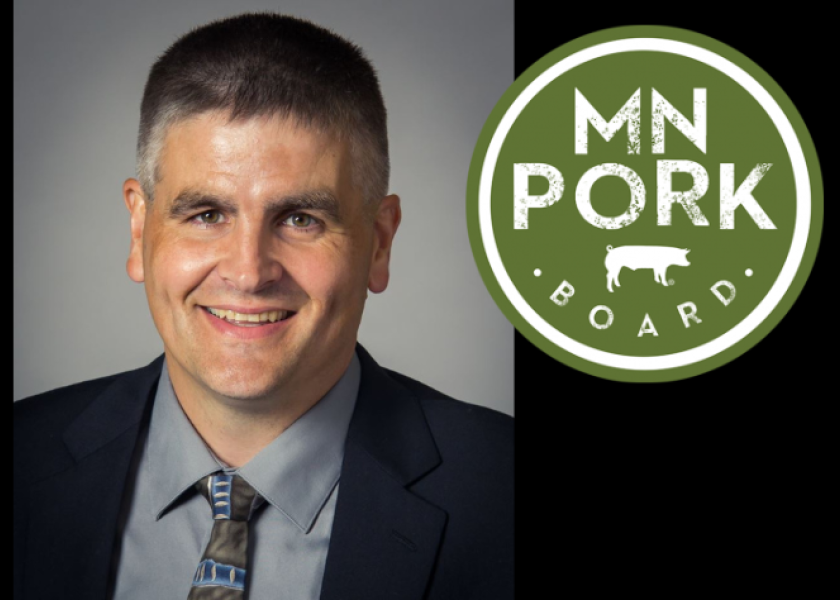Minnesota Pork Board Honors Adam Barka with Environmental Steward Award

The Minnesota Pork Board recognizes Adam Barka as this year’s Environmental Steward of the Year award recipient.
Adam Barka’s resolute passion for ensuring thriving rural communities where people have the freedom to live and work where they please is the driving force behind his commitment to environmental stewardship.
Passionate Direction
Barka’s upbringing prepared him for a career in agriculture, as he grew up on a diversified livestock farm that consolidated to strictly dairy farming in his high school years. He studied his way through two years at North Dakota State University and two years at the University of Minnesota focused on animal production systems with an emphasis on dairy production.
He and his wife, Trista, moved back to Litchfield where Barka worked at his family farm for one year then transitioned to a role at the Meeker County Soil and Water Conservation District as an assistant county feedlot officer. In this role, he oversaw environmental compliance for feedlots, wetlands, noxious weeds, and stormwater. To this day, he is grateful for his mentors and co-workers during his four years serving in that position, as they prepared his understanding of the nuances of regulatory and zoning issues in Minnesota and the four other states he oversees compliance in.
In 2008, Barka joined Christensen Farms as a business development representative. One month into this role, an opening in environmental compliance became available that more appropriately suited his sweet spot for sustainability. Moving through the ranks within the Agronomy and Environmental Stewardship department within the company, Adam has held the position, Director of Environmental Stewardship, for more the last 9 years and has responsibility for the agronomy manure application team.
Pursuing Excellence
Christensen Farm’s commitment to pursuing excellence and stewardship was Barka’s primary reason for joining the company. Though his time working under Bob Christensen’s leadership was limited, Barka described that Bob’s “vision for environmental stewardship” still influences his thoughts and actions today.
“I have been honored to work for an organization where stewardship has been part of the culture since it’s founding,” stated Barka. “At CF, I am focused on how we pursue excellence and not on doing the bare minimum or just what is required.”
He noted conversations surrounding the question, “How can we do this best, long-term?” occur daily. Discussions with this approach prove to be much more rewarding than just clearing the bar.
In his effort to go above and beyond regarding environmental stewardship, Barka is most proud of the innovative watering toggle valve installed in many of their farms to provide increased water management. After identifying inconsistent water flow, overflowing water pans, and diluted manure, Barka led the agronomy team to adopt a new water delivery mechanism. Upon implementation, the valve has been a successful part of reducing more than 60 million gallons of water use in their wean-to-finish system annually. This water conservation effort was recognized by the Minnesota Pollution Control Agency (MPCA) for improvements in water usage, reduction of waste, and increased environmental stewardship. Among other practices, Barka encourages farmer participation in soil conservation efforts such as utilizing minimal-till manure application practices, cover crop application, and annually testing manure structures.
“We manage all parts of our operations to ensure appropriate resource use, whether it is water, feed, energy, or land,” Barka reflected. “We also focus on the location of our facilities and ensure we work with our neighbors to address questions about our facilities.”
When identifying new site locations, and maintaining current sites, Barka wants to make sure neighboring property owners feel heard and valued. Each party holds a significant investment, and working together, especially when issues do arise, is paramount.
“I want to ensure that people feel heard, whether it is a neighbor, regulator, or team members. I want to do the right thing every day,” stated Barka.
Battling Regulatory Restrictions
It’s no secret Minnesota regulations are one of the largest threats to farmer’s freedom to operate in this day and age. Barka argues the same threat holds true for environmental issues facing pig farmers today. Increased regulations do not necessarily translate to increased environmental stewardship, and they also can hinder productive innovation.
“There are an increasing number of regulations that don’t represent or encourage innovation to occur to allow us to achieve excellence and stewardship,” described Barka.
For example, he noted the timeline constricting manure application can prohibit optimal manure usage and environmental consideration depending on each year’s weather conditions. The impact restrictive timelines will have, depending on each year’s weather story, will be significant. Barka believes that in order to maintain our sustainability truth, farmers must not be forced to abide by regulations that do not provide benefit to the environment.
“I have always been impressed by MPPA, and they have made progress in ensuring improvement in regulations,” Barka acknowledged. “We (MPPA) believe in reasonable regulations, not no regulations. Our concern is that we are no longer at that point.”
Permitting challenges in the 1990s influenced his desire to safeguard the continuance of livestock agriculture in Minnesota. While working as the county feedlot officer, a large portion of his job was helping farmers receive permits and continue their operations to help them grow.
A major contributor to his love for the swine industry is its accessibility to a wide swath of people. Owning a barn is not a prerequisite for involvement in the industry; the many outside services necessary to keep a barn up and running provide numerous business opportunities. Whether someone is working at the farm, receiving, or hauling manure from the organization, mowing, or participating with the farm in a different capacity, Barka continues to keep rural residents in place in his role at Christensen Farms.
Ensuring reasonable environmental compliance and seeing projects permitted and completed provide personal satisfaction for Barka, which all leads back to his ultimate goal of sustaining thriving, rural communities. Every permit acquired equates to another family or individual who has the opportunity to stay in their rural community.
“I hope there are no kids out there wondering if they will have an opportunity to farm or live in rural areas because regulations have forced families to leave their farms or give up their dreams of raising families in rural areas,” stated Barka bleakly. “I hope I can provide value to the MPB/MPPA organization that allows more people to live and work in rural areas and continue the legacy of midwestern producers providing food for a growing world.”
Sustainability = Common Practices
“We need to continue to push our sustainability truth,” Barka reasoned. “Midwestern swine production is the most sustainable, regenerative agriculture there is in the world.”
In the Midwest, Minnesota pig farmers are “uniquely positioned” to provide sustainable food for people here and across the globe. Utilizing manure management and taking advantage of the nutrient cycle to grow crops that are then fed to the pigs provides the greatest story of regenerative agriculture.
“I view sustainability as something pork producers have focused on before it was cool,” claimed Barka.
Barka believes “sustainability” has become a buzzword some farmers shy away from because the overarching shared goal gets lost in the message. The fact is, farmers have been making sustainability choices for decades, whether or not they consider their practices to fall under the “sustainability” umbrella.
“Moving pigs indoors, filtering barns to ensure pig health, formulating feeds, and utilizing by-products are all practices pig farmers have adopted over the last few decades that were sustainable choices,” Barka recounted. “Sustainability isn’t something we have to do different; we’ve been doing it.”
Many different perspectives throughout his career from family, supervisors, and coworkers guided his work, specifically John Boe, Dwight Dahlman, Gary Koch, Dave Rosenhamer, and his wife Trista, whom he stated nothing he does would be possible without her. These individuals, and many more, challenge him to think about issues from different viewpoints, and he acknowledged any success he’s experienced wouldn’t have been possible without his teammates on his agronomy and sustainability teams.
Barka strives to learn from all he encounters and lead by example. His core values of integrity, adaptability, and respect drive his work. These values coincide with his unwavering mission to ensure people’s freedom to live and work in rural areas. He admits it took him several years to realize his true passion, but once he did understand it, he was “able to find contentment.” Finding one’s passion will take time, but he believes passion must drive a person’s work to be truly fulfilling. He looks forward to seeing people meet their calling to be farmers, to raise food for others, and provide opportunities for people to live and work where they want to.
Barka hopes the average person knows this about the pork industry: “We are people, working hard to provide food and opportunities for all people. We do our best to navigate each year’s weather story so that future generations will have a business to move forward in an environment that can support their work.”







